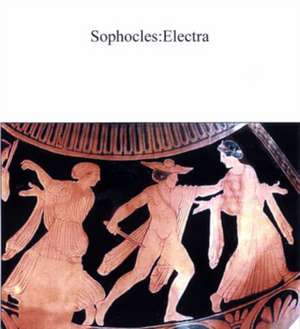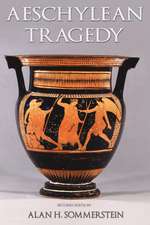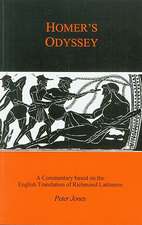Sophocles: Electra: Companions to Greek and Roman Tragedy
Autor Michael Lloyden Limba Engleză Paperback – 22 iun 2005
Din seria Companions to Greek and Roman Tragedy
- 14%
 Preț: 163.24 lei
Preț: 163.24 lei - 9%
 Preț: 150.96 lei
Preț: 150.96 lei - 9%
 Preț: 150.96 lei
Preț: 150.96 lei - 7%
 Preț: 163.71 lei
Preț: 163.71 lei - 14%
 Preț: 163.24 lei
Preț: 163.24 lei - 14%
 Preț: 163.42 lei
Preț: 163.42 lei - 14%
 Preț: 163.24 lei
Preț: 163.24 lei - 7%
 Preț: 163.71 lei
Preț: 163.71 lei - 14%
 Preț: 163.24 lei
Preț: 163.24 lei -
 Preț: 163.34 lei
Preț: 163.34 lei - 8%
 Preț: 152.01 lei
Preț: 152.01 lei - 7%
 Preț: 163.71 lei
Preț: 163.71 lei - 15%
 Preț: 150.59 lei
Preț: 150.59 lei - 14%
 Preț: 163.71 lei
Preț: 163.71 lei -
 Preț: 163.71 lei
Preț: 163.71 lei - 15%
 Preț: 162.54 lei
Preț: 162.54 lei - 24%
 Preț: 150.59 lei
Preț: 150.59 lei - 14%
 Preț: 172.27 lei
Preț: 172.27 lei - 15%
 Preț: 176.07 lei
Preț: 176.07 lei - 23%
 Preț: 234.44 lei
Preț: 234.44 lei -
 Preț: 163.71 lei
Preț: 163.71 lei - 7%
 Preț: 164.05 lei
Preț: 164.05 lei -
 Preț: 150.59 lei
Preț: 150.59 lei - 14%
 Preț: 163.52 lei
Preț: 163.52 lei - 14%
 Preț: 164.40 lei
Preț: 164.40 lei - 14%
 Preț: 163.34 lei
Preț: 163.34 lei - 15%
 Preț: 150.33 lei
Preț: 150.33 lei - 14%
 Preț: 169.62 lei
Preț: 169.62 lei - 24%
 Preț: 170.42 lei
Preț: 170.42 lei - 24%
 Preț: 163.24 lei
Preț: 163.24 lei - 24%
 Preț: 157.41 lei
Preț: 157.41 lei - 24%
 Preț: 150.68 lei
Preț: 150.68 lei
Preț: 163.24 lei
Nou
Puncte Express: 245
Preț estimativ în valută:
31.24€ • 32.49$ • 25.79£
31.24€ • 32.49$ • 25.79£
Carte tipărită la comandă
Livrare economică 14-28 aprilie
Preluare comenzi: 021 569.72.76
Specificații
ISBN-13: 9780715632802
ISBN-10: 0715632809
Pagini: 144
Dimensiuni: 135 x 215 x 13 mm
Greutate: 0.2 kg
Editura: Bloomsbury Publishing
Colecția Bristol Classical Press
Seria Companions to Greek and Roman Tragedy
Locul publicării:London, United Kingdom
ISBN-10: 0715632809
Pagini: 144
Dimensiuni: 135 x 215 x 13 mm
Greutate: 0.2 kg
Editura: Bloomsbury Publishing
Colecția Bristol Classical Press
Seria Companions to Greek and Roman Tragedy
Locul publicării:London, United Kingdom
Notă biografică
Michael Lloyd is Senior Lecturer in Classics at University College Dublin. He is the author of The Agon in Euripides (1992) and of an edition of Euripides' Andromache (1994)
Descriere
The author discusses whether Orestes' vengeance on his mother for her murder of his father is a just and final act of violence in 'Electra', or whether Sophocles ironically implies that it is more problematic than it seems. He pays particular attention to Electra herself, but also discusses wider issues of Greek ethics.

















